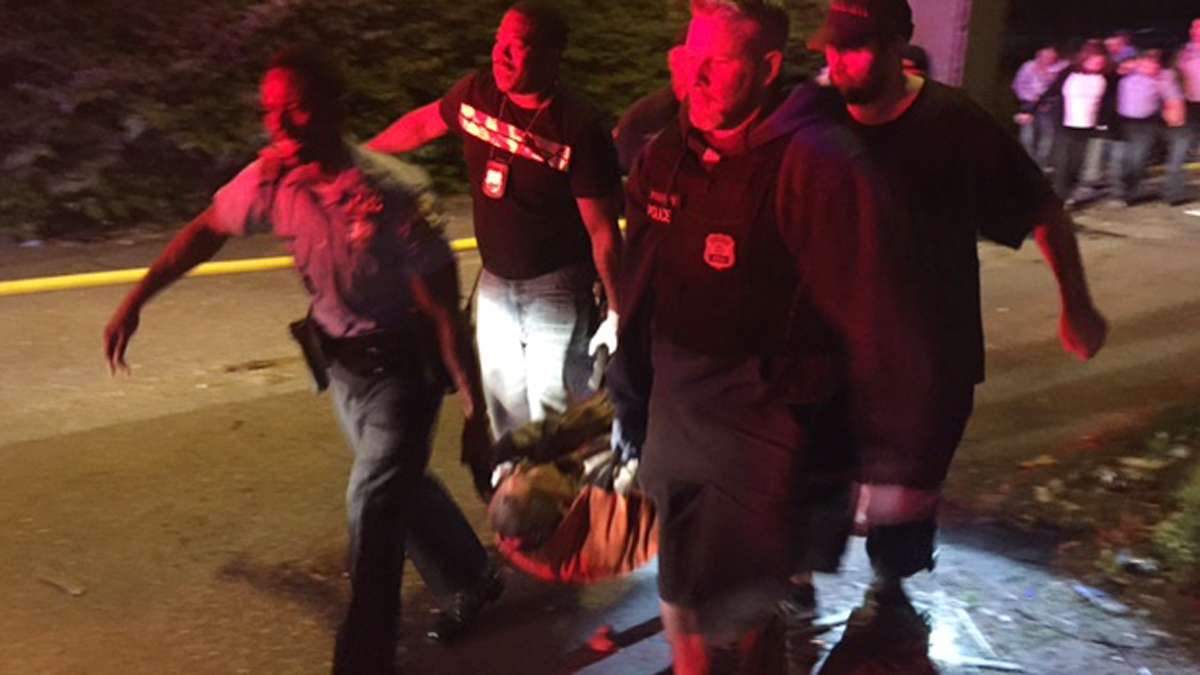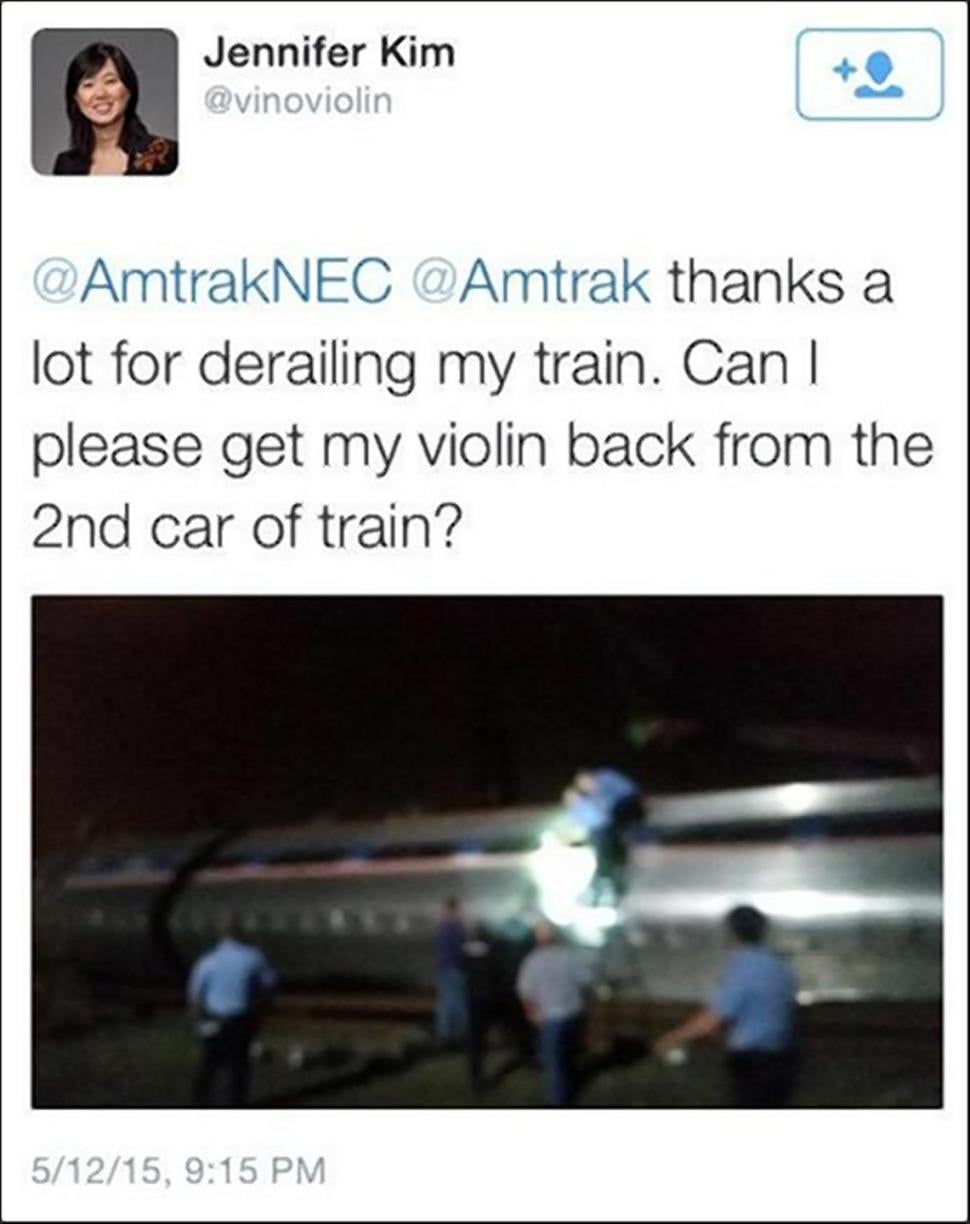The good, bad and ugly of Twitter came out for Amtrak derailment
Listen
In this photo, taken by Paul Cheung, an Associated Press manager who happened to be on board the Amtrak train when it derailed on Tuesday night, a passenger is shown being carried away from the crash site. (Paul Cheung/AP Photo)
Following the deadly derailment of Amtrak Northeast Regional train No. 188 on Tuesday night in Philadelphia’s Port Richmond neighborhood, Twitter and Facebook lit up with reactions. And reactions to the reactions. Is the backlash appropriate? I turned to Steven Petrow, a go-to-guy for questions of modern electronic civility.
Following the deadly derailment of Amtrak Northeast Regional train No. 188 on Tuesday night in Philadelphia’s Port Richmond neighborhood, Twitter and Facebook lit up with reactions. And reactions to the reactions, including a lot of scolding from social media users — from criticism of media coverage to the knuckle-rapping that professional violinist Jennifer Kim got when she tweeted about retrieving her instrument from the wreckage. Is the backlash appropriate?
I turned to Steven Petrow, the “Digital Life” columnist for USA Today. He’s a go-to-guy for questions of modern electronic civility.
 Speak Easy: So how about Jennifer Kim? After she was off the train, she tweeted: “Thanks a lot for derailing my train. Can I please get my violin back from the 2nd car of the train?” Twitter attacked her for being insensitive to the dead and injured. Twitter also defended her: She just survived a train wreck; she must have been in shock; give her a break.
Speak Easy: So how about Jennifer Kim? After she was off the train, she tweeted: “Thanks a lot for derailing my train. Can I please get my violin back from the 2nd car of the train?” Twitter attacked her for being insensitive to the dead and injured. Twitter also defended her: She just survived a train wreck; she must have been in shock; give her a break.
She ultimately suspended her account.
Should people just lay off criticizing the victim? Or does she deserve the criticism? Or was this bullying?
Steven Petrow: You know there are so many elements to this situation, but I think the one that I really want to communicate is: When there’s a disaster like this, let’s not start blaming people. We can’t judge her. We don’t really know what her state of mind was. I certainly don’t.
I read that tweet a couple of times, and to me it seemed sarcastic. And I’ve often said to myself ‘Sarcasm is not a universal language,’ so you need to be careful about that. But other people pointed out this might be her primary source of income. These violins are very expensive. She might not have understood the magnitude of the disaster at that moment. Give her a break. This is all part of this blaming of society. And if we could be more embracing rather than attacking, I think we could see things more clearly.
SE: Former U.S. Rep. Patrick Murphy, NBC producer Janelle Richards, Paul Cheung from the AP, Philly music producer Yameen Allworld — and others — tweeted photos and videos from the scene.
— Patrick J. Murphy (@PatrickMurphyPA) May 13, 2015
Immediately journalists began asking to talk to them and to get permission to use the shots. Then a Twitter contingent began ganging up on the journalists for being invasive. Who’s right? What should have happened instead?
SP: This seems to me to be a case of a lot of people not understanding what it’s like to be a journalist who works for a major corporation. I have been in this position myself, where you need to go through certain steps to make sure there’s no liability down the road. So the fact that these reporters and producers are tweeting, asking for permission — they’re doing their job.
There’s absolutely no expectation that Murphy or anyone else needs to respond in the moment. And of course they should not prioritize a request for the use of a photo or tweet over being present in the moment and helping others.
I also follow my own mantra, which is: Know the rules well, so you can break them effectively. Which is not my quote. It’s the Dalai Lama’s. So, you know, there are times when you just need to suspend the rules that you follow — and a disaster would be one of them. The law is not clear, but I would never want to do something that in any way interferes with what somebody does at a crash site. That’s the higher, ethical, moral law, as opposed to whatever the corporate titans tell us.
SE: Should we even care about the scolds on Twitter? I recognize that there’s a certain hypocrisy to scolding the scolds. Is it “Anything goes”? Is all of this simply ignorable?
SP: I think it’s part of a larger problem of blaming on social media, bullying on social media. It just kind of taps into that vein. In general, I don’t think that ignoring them is a good idea, because they kind of take strength from this. They build on themselves and then these packs form. There kind of was a pack mentality on Twitter the other night.
No, I think sometimes someone needs to come in, as some people did, and say, ‘Stop. Get a reality check. This is wrong.’ Focus on what you can do — disaster relief, whatever it is. Break out of this mentality of attacking and blaming for everything.
We’re seeing it also with: Is it the infrastructure that is wrong? Is it the engineer? Now that it appears that the engineer is gay, is this because he was a diversity hire?
Gays have a higher rate of mental illness than do straights. You decide if engineer's homosexuality is worth noting. I report it. #Amtrak188
— Charles C. Johnson (@ChuckCJohnson) May 13, 2015
.@6LambsMom @ChuckCJohnson Issue is whether Diversity hiring put an unqualified incompetent in charge, resulting in needless deaths.
— John Rivers (@JohnRiversToo) May 13, 2015
I mean there are just so many things that, first of all we don’t know, but then this rush to judgment on social media that is really kind of counterproductive and often harmful.
SE: What about the people trying to make it about themselves (including some celebrities)? e.g., OMG I was on that train last week — I am so lucky!
Yeah, you and a million other people. It’s the busiest rail corridor in the nation. You’re not really that lucky.
I held myself back from commenting on this. Should I be as put off by this as I am? Is this just something people do to help understand what’s happening?
SP: It seems to me that this is a case of celebrities acting like celebrities. They can’t step out of that limelight. And oftentimes their narcissism knows no boundaries. And this is a great example of them putting themselves into a situation where they don’t belong.
I think if there’s going to be any kind of fund for relief or for the victims, that’s a time when celebrities can bring attention to help raise some money, to help do some good. But for someone to attach themselves to a horrible story like this with ‘I was on that train last week’ … I’m sorry, I don’t think anyone cares.
SE: What about the ordinary people?
SP: I’m an ordinary person. And I’ve sometimes been two steps away from something bad that’s happened. And I’ve certainly thought to myself, ‘Geez I could have been on that train or on that plane.’ I do think it’s a way to humanize it for us as people, and to relate to it. And I think also, in a way, we live in these bubbles where we feel like we’re protected, and so when something happens, like this Amtrak disaster, it bursts that bubble. And for people who are somehow close to that situation, it’s a real reality check. Life does not go on forever. Things do happen. So I understand that human impulse. But to publicize it in a way like others do, that kind of goes in the wrong direction.
SE: On Wednesday, so many people were ready to solve the puzzle. This includes news outlets, of course, but it also played out for individuals across Twitter and Facebook. Some blamed infrastructure. Some blamed Congress, who voted in favor of funding cuts to Amtrak even yesterday. Then we found that the train was speeding. Then … Hey, was the engineer drunk? What does this speculation say about the culture of blaming? Needing a scapegoat?
SP: We love to come to quick answers, and we’d rather have an easy answer. Unfortunately many of these problems, and this one in particular, will probably have multi causes but I don’t know that yet. That’s why the NTSB is doing its thorough, thorough job. And this sort of wild speculation about whether it was the engineer, whether it was the infrastructure, the speeding train, was he drunk — all of these things. We simply don’t know, and it’s really not helpful. It doesn’t shed any light. It certainly makes for more fire, it’s incendiary, and really counterproductive. But it’s very much a part of this moment in time when we look to blame wherever we can, and that’s not a healthy impulse.
SE: There seems to be a culture on Twitter, generally, to tell everyone exactly how they should feel and exactly what they’re doing wrong. Are they just being smug? is this kind of feedback helpful, important, inappropriate?
SP: I think it’s as much as people trying to tell others how to feel as this becoming an environment, a platform, for everyone to have a voice to saw exactly what they feel. And certainly at one level, that is great, because we live in a culture that is often very top-down in the voices that we hear. Are those that are entrenched with money or power, whatever. Democratization here, the leveling, is important. But not all voices are equal. And oftentimes what is said is hurtful and mean and just kind of reactionary.
I often counsel people, before they tweet or post of snapchat, especially if they’re in an emotional moment, to pause, to think twice before you hit that send button. And that’s a good rule for everybody when they’re caught up in the emotion of something, especially like this disaster.
SE: We’ve been concentrating a lot on the negative aspects of what played out on social media. What do you see as the positive aspects of what’s been going on, Tuesday night and Wednesday?
SP: We’ve really seen how much concern there is, and how much feeling and empathy. And that’s powerful, and I think if I were in any way involved in that train wreck, to have read those kind of tweets that are supportive, they really do make a difference. It helps us to feel like we are part of a larger community, a community that does care.
When we look at the big picture here, actually, I would hope that that would be the headline that comes out of this. Certainly there are the severe, harsh tweets that have been promulgated, but I think they’re the minority, and what’s really important is how social media can actually bring us together and not take us apart of take us down.
—
Author and journalist Steven Petrow writes a column for USA Today called “Digital Life” about navigating the unwritten rules of social media and technology.
WHYY is your source for fact-based, in-depth journalism and information. As a nonprofit organization, we rely on financial support from readers like you. Please give today.

